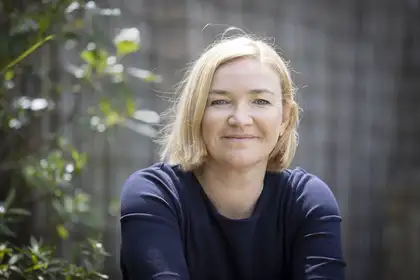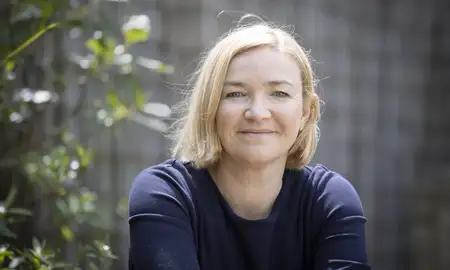
Professor Sarah Riley
These questions and more are explored in a series of ground-breaking books produced by Te Kunenga ki Pūrehuroa Massey University’s renowned Critical Health Psychology Masters teaching programme and research hub, which in 2020 celebrated its 30th anniversary.
Critical Health Psychology Professor Sarah Riley is the co-author of Digital Feeling published in 2023, the third in a series on the impact women’s engagement with digital media has on their health. The first in the series, Postfeminism and Health, won the 2021 British Psychology Society book awards.
The latest book focuses on the emotions women experience when engaging with digital media, encountering ideas of ideal femininity that shape the way they think about themselves.
“There's a lot of feel-good feelings that run through social media and make it attractive for us to watch," Professor Riley says.
"For us, what's important is thinking about what do those good feelings do in terms of shaping our sense of self and what's possible for us."
One chapter in the book looks at the impact on viewers of the Get Ready With Me makeup videos on TikTok, the hashtag for which has clocked up 148.5 billion views.
"Young women start off with what looks like a make-up-free face and then they show you what they've done to get ready.
"Very feel-good, very positive, very intimate. It feels like you are literally in their bedroom, learning about who they are and almost like they're a friend. So that's a kind of a nice feeling but the whole time it's promoting loads and loads of product.
"So instead of raising concerns about the amount of product young women are expected to wear to feel normal, the good feeling makes it feel super attractive."
Professor Riley notes that in order to make money the young women producing the videos are obliged to always be positive, look beautiful and sell things.
“Part of what they are selling is themselves. The videos cycle these ideas that we should think of ourselves as a brand, always on the sale, always valued by how much we are liked or marketable.
“The question is what is the good feeling actually allowing to happen that we might be a bit more concerned about?”
Social media, she says, encourages women to be confident, resilient and positive in their everyday life.
“But we’re interested in how young women don’t have many other options. When we start to expect positivity as a measure of being a good person, if you’re not positive – if you’re anxious, if you're frustrated, if you're angry - you're having bad feelings, and in the logic of positivity, bad feelings make you a bad person.
“Our concern is that it encourages young women especially to silence their feelings instead of looking at where those feelings come from.”
The phenomenon of the proliferation of online cat videos also gets a chapter.
“There's a sense now that there's a never-ending crisis. It's just one thing after another. And so we watch cute cat videos," Professor Riley says.
“In a world where we are always on show, the cats give us this sense of openness, honesty and ordinariness. They’re not pretending to be anything else and that give us a sense of comfort.
“But there’s another element, in that the cats often hurt themselves. There’s a kind of pleasure, or tension in seeing the cat hurt, or looking as if it could be hurt. In the book we're looking at those kind of complex feelings around the cute cat videos.”
Professor Riley describes the focus of the Critical Health Psychology programme as being on the individual in context.
“If we want to understand why people think and behave the way they do, we need to look at the social, political, economic and material factors shaping their thoughts, feelings and decision-making,” she says. “Otherwise, it’s easy to blame the victim or suggest implementing policy or interventions that can do more harm than good.”

Associate Professor Tracy Morison.
It's an approach that is at the heart of Sexual and Reproductive Justice: From the Margins to the Centre, co-edited by Associate Professor Tracy Morison, who currently leads the programme.
Published in 2022, the book brings together a collection of essays designed to introduce innovative thinking around topics such as teenage pregnancies, access to abortion, surrogacy and contraception.
The core principles of the Reproductive Justice movement are based on the human right to have children or not, to have children under chosen circumstances and to raise them in supportive environments.
Dr Morison says these rights intersect with social justice issues like economic disparities, education, immigration and citizenship.
"Social factors limit people’s ability to exercise rights and make choices. It’s a fairly new area in psychology, mainly used in family planning programming. Academics have been a bit late in the game.
“We wanted to look at the gaps in reproductive justice research – ethnicity, race, gender diversity, age, sexuality, disability for example -- and invite voices from around the world for a more inclusive conversation. We think taking a broader approach has a lot of potential, not just for scholarship, but also for policy and for practical application in the real world," Dr Morison says.
She now plans to start thinking about the issue of sexual reproductive health and justice in relation to climate change.
“It’s on my radar. One of the founding principles of reproductive justice is the need for a supportive environment in bringing up children. What might climate change mean for people’s reproductive lives and futures?”
Professor Riley and Dr Morison are now collaborating on new research looking at the use of menstrual tracking apps, funded by a Marsden grant.
“There’s a whole lot of people using these apps that aren’t really designed for them. The research is looking at how people reappropriate the technology so it works better for them," Professor Riley says.
The research team plans to recruit three cohorts of users of the apps: perimenopausal women, older teenagers and people who have given birth in the past 18 months.
“We’re particularly interested in recruiting women of colour, sexual minorities and people managing chronic illness.”
For more information, or if you’d like to participate, please email MTAresearchproject@massey.ac.nz
Related news
Celebrity bodies, post-feminism and ageing – health psychologist explores
From the impact of pop culture on body image to why men dance the way they do, how people manage ageing and illness, and whether self-help books actually help - Sarah Riley, a professor in critical health psychology, explores.

Postfeminism and Body Image - looking beautiful while making a nice smoothie
Professor Sarah Riley is the co-author of newly published book that explores the intersection of postfeminism and health studies.
